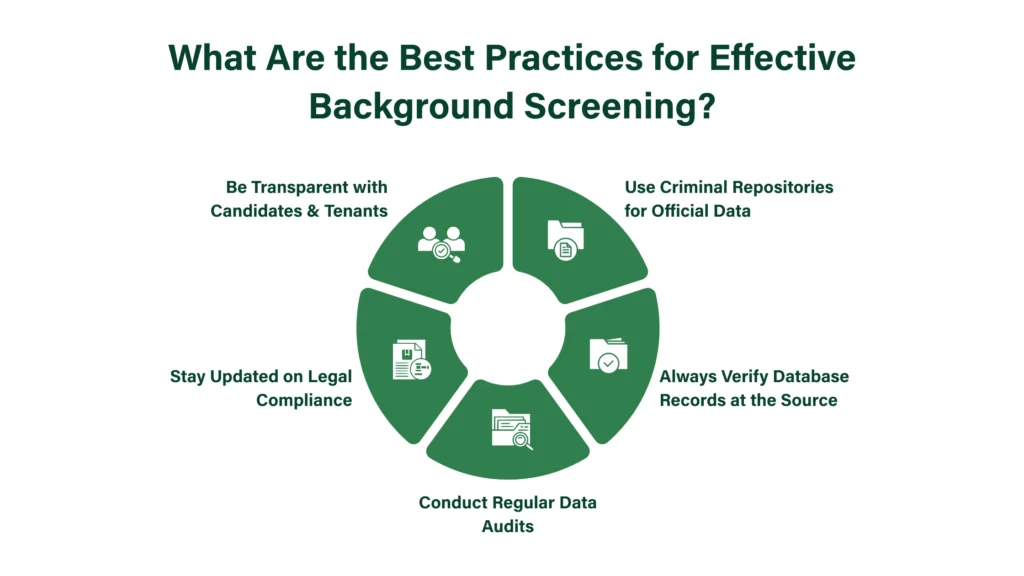The background screening industry has grown into a multibillion-dollar market, with 94% of employers and 90% of landlords relying on criminal background checks to evaluate candidates and tenants. However, not all background checks are created equal. The quality and accuracy of a background check depend heavily on where the criminal record information is stored and how it is retrieved.
In the background screening industry, criminal records are primarily stored and accessed through criminal databases and criminal repositories. While both serve as sources of information, their differences in data accuracy, update frequency, and compliance requirements can significantly impact screening results.
This article explains the differences between criminal databases and repositories, how they function, and why understanding their limitations is critical to making informed hiring and leasing decisions.
What Are Criminal Databases?
Criminal databases are aggregated collections of records compiled from multiple sources, such as:
- Public records
- Court systems
- Law enforcement reports
- Third-party data providers
These databases provide broad coverage across multiple jurisdictions, making them a useful tool for initial screenings or identifying potential red flags across different areas.
Key Characteristics of Criminal Databases:
- Aggregated from multiple sources
- Not always updated in real-time
- Broad coverage but may lack depth or verification
Caution: Since criminal databases pull from many sources, they can contain incomplete or outdated information if not regularly maintained. Employers must verify records at the source before making decisions.
What Are Criminal Repositories?
Criminal repositories, in contrast, are officially maintained by state or federal agencies. These repositories collect direct, verified data from:
- Courts
- Law enforcement agencies
- Other government record holders
Because repositories store information directly from legal sources, they provide accurate, up-to-date records within a specific jurisdiction.
Key Characteristics of Criminal Repositories:
- Sourced directly from official government records
- Frequently updated, often in real-time
- More accurate and jurisdiction-specific
Best Use Case: Repositories are the most reliable source for criminal record verification because they ensure accuracy and compliance with background screening regulations.
Criminal Database vs. Repository: A Key Comparison
Understanding how criminal databases and repositories differ is crucial when deciding whether to use them for background checks.
| Factor | Criminal Databases | Criminal Repositories |
| Data Source | Aggregated from multiple sources (public records, courts, third-party data providers) | Directly sourced from official records (state or federal courts, law enforcement agencies) |
| Accuracy | May contain outdated or incomplete records due to data aggregation | Highly accurate since records come from primary legal sources |
| Update Frequency | Updated periodically (may lag behind real-time records) | Updated more frequently, often in real-time |
| Coverage | Broad geographic coverage, but some jurisdictions may be missing | Limited to specific jurisdictions (state or county level), but data is more reliable |
| Disposition Updates | May not reflect case dismissals, expungements, or updates promptly | Case outcomes (dismissals, verdicts, expungements) are updated as processed |
| FCRA Compliance | Requires further verification at the source to ensure compliance | Naturally more compliant, as data is sourced directly from official government agencies |
Why Does This Matter for Background Screening?
Understanding how criminal records are stored and retrieved is essential for ensuring accurate, timely, and legally compliant background screening. Here’s why:
1. Avoiding Incomplete Background Checks
Criminal databases may not include records from every jurisdiction, increasing the risk of overlooking key criminal history information. Employers and landlords who rely solely on databases risk missing critical details about a candidate or tenant.
2. Ensuring Accuracy & Reducing Errors
Criminal databases can contain duplicate records, outdated cases, or missing information due to aggregation errors. This increases the risk of false positives (reporting someone with no record) or false negatives (failing to report actual convictions).
3. Staying Compliant with the FCRA
Under the Fair Credit Reporting Act (FCRA), background check providers must ensure their data is accurate and up-to-date. Since databases may contain outdated records, the information must be verified at the official repository before taking any adverse action.
What Are the Best Practices for Effective Background Screening?

To ensure accuracy, compliance, and risk mitigation, organizations should follow these best practices:
1. Use Criminal Repositories for Official Data
Whenever possible, rely on state or federal repositories for the most accurate, real-time criminal record information.
2. Always Verify Database Records at the Source
If using criminal databases for initial screenings, verify the final decision-making information directly at the county, state, or federal repository.
3. Conduct Regular Data Audits
Periodically review and audit data sources to identify inaccuracies, missing records, or outdated information.
4. Stay Updated on Legal Compliance
Background screening regulations change frequently—especially FCRA laws. Stay updated to ensure your screening process remains compliant and legally defensible.
5. Be Transparent with Candidates & Tenants
Ensure that applicants understand the screening process and their rights under FCRA, including their ability to dispute incorrect records.
Get Accurate & Compliant Background Checks with Verification Screening Solutions

At Verification Screening Solutions, we understand the importance of accurate, reliable, and legally compliant background screening.
Our services include:
- County Level Criminal Search
- Statewide Criminal Search
- Federal Criminal Search
- Multi-state Criminal Search
- Motor Vehicle Report (MVR)
- Sex Offender Search
- Federal Civil Search
- County Level Civil Search
- SSN Trace
- Employment Verification
- Education Verification
- Fingerprinting
When accuracy, compliance, and trust matter—we deliver.
Contact us today to learn how we can assist with your background screening needs.

